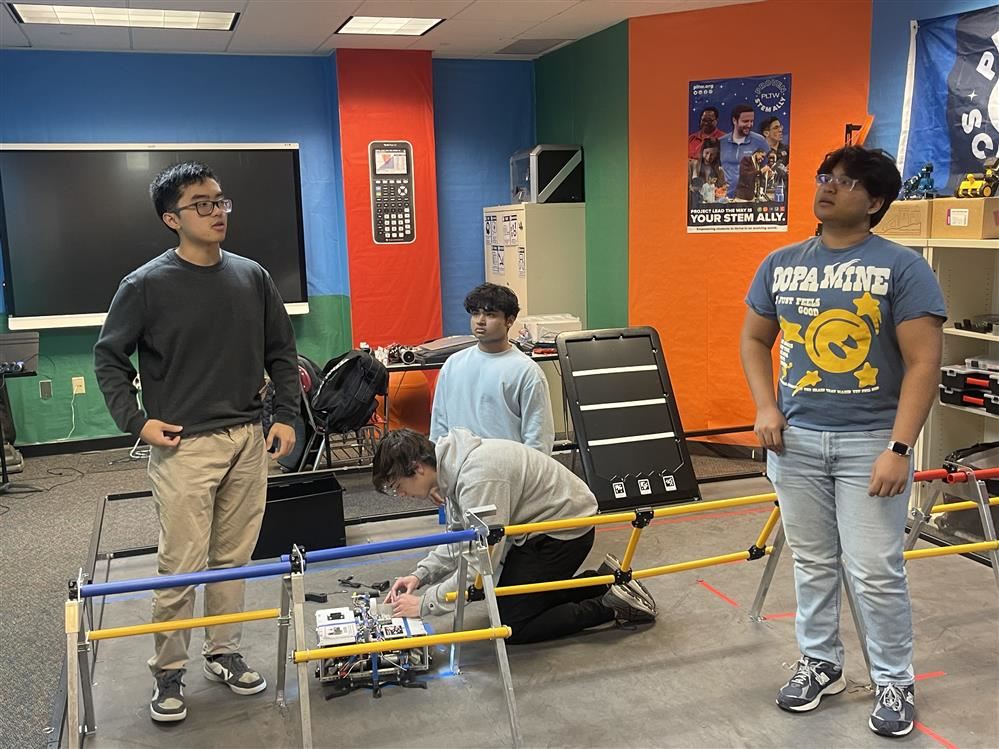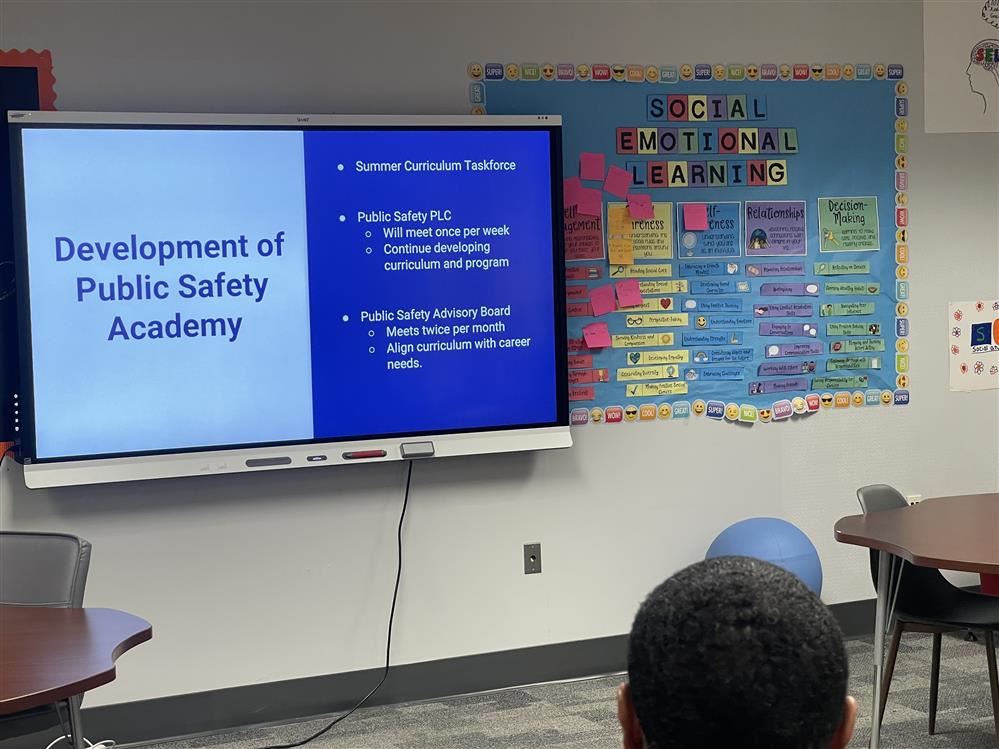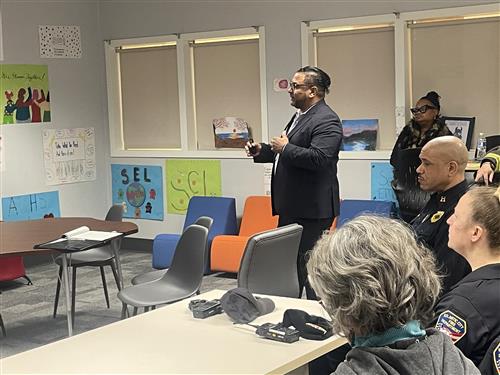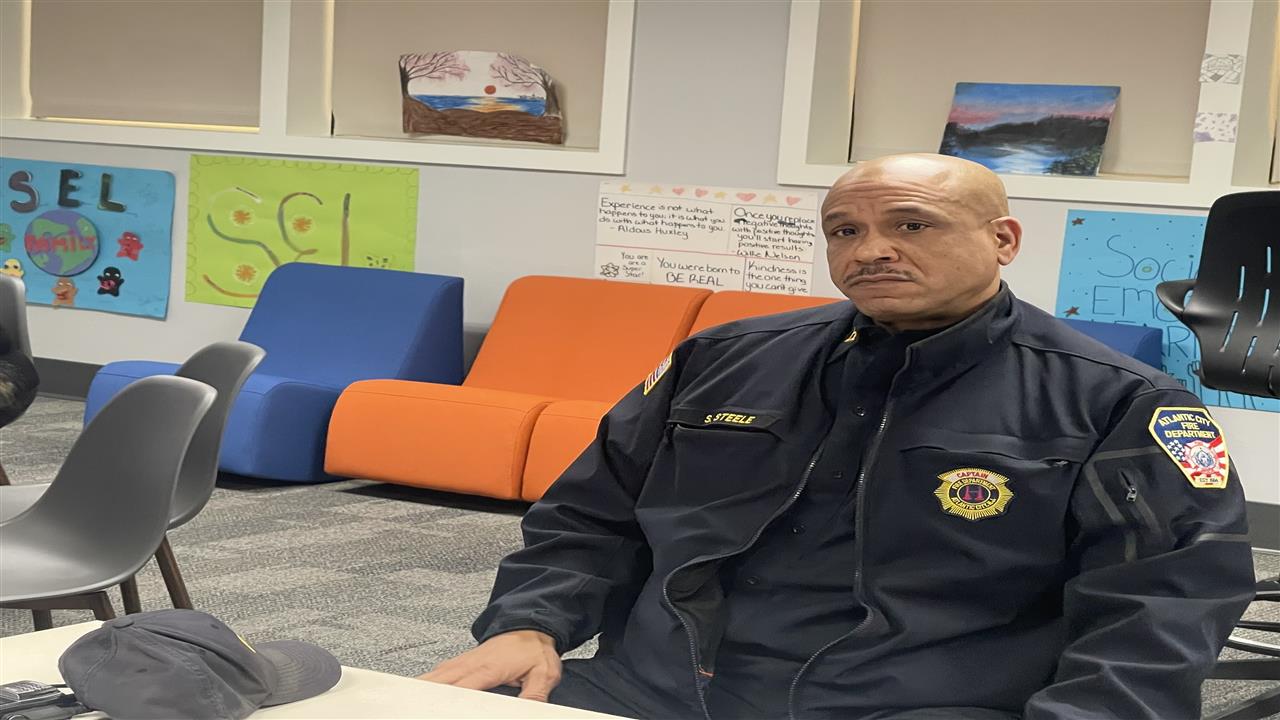Atlantic City High School Offers Award-Winning Robotics Team, Other Programs, Classes and Clubs for Every Taste

ATLANTIC CITY — In less than a year’s time, the Atlantic City High School Robotics Club has distinguished itself as a team to reckon with.
They’ve been to three competitions. They've won twice. And they've broken a state record.
“I just love doing this,” said Robotics Club co-founder Devin Huynh. “It’s my passion.”

(Devin Huynh is the co-founder of the Atlantic City High School Robotics team.)
Huynh, along with seniors Adip Tashfi, Max Duerr and Saif Naser are pieces of the winning team. But when they go to competitions they work together as one. “It’s an opportunity to build things with people with similar mindsets,” Hyunh said.

(Adip Tashfi (Left) and Max Duerr (Right) program their award-winning robot.)
The team, already ranked 14th out of 40 teams statewide, built a robot that competes against other student-built robots with defined tasks. The robots have to pick up 3D pixels and place them on a wooden board. If they can place them in a specific shape, they earn extra points. Then the robots have to identify a square shape in a defined area and put a pixel next to it. The robot has to suspend itself in the air using its claw. And also, use that claw to throw a pixel outside the defined area.
On Jan. 14, Atlantic City High School earned the highest match score by an alliance at First Tech Challenge New Jersey in the Southern League Meet held in Egg Harbor Township. That’s when the team set a New Jersey State Record, 212 points, for the highest match score.
That honor came on the heels of another highest match score award on Oct. 29, 2023.
Atlantic City High School Stem Coordinator Joseph Costello said he was surprised the team did so well, so quickly. “They enjoy competing, so we were pleased when they started winning awards and breaking records,” said Costello. “We’re extremely proud.”
The robotics team is just one of the high school’s many success stories. In fact, Atlantic City High School students have access to a plethora of opportunities as good, if not better, than any around the country.

(Atlantic City High School Principal Constance Days-Chapman wants the community to know how much Atlantic City High School has to offer.)
“The perception is that Atlantic City High is a bad school, that kids are always in the halls and that there are a lot of fights,” said Atlantic City High School Principal Constance Days-Chapman. “I want to show what we have to offer and what really takes place at Atlantic City High. The experience that students will get here, is one they won’t get anywhere else.”
In addition to robotics, Atlantic City High School offers:
- WAJM radio station
- Tv Broadcasting with a full Production Studio
- The ACHS Public Safety Academy
- A unique Teen Center,
- A Social Emotional Learning Lab
- Teen Mental Health First Aid Training
- The Seal of Biliteracy Test
- Cybersecurity Training
- Industrial Arts
- Junior Reserve Officers’ Training Corps
- Some 19 Advanced Placement Courses
- A winning Boys Basketball Team;
- A fully renovated weight room
- A renovated cafeteria;
- Dual credit partnerships with area colleges and universities; and
- Various clubs appeal to different student interests.
“There is so much that Atlantic City High School has to offer,” said Superintendent of Schools Dr. La’Quetta S. Small. “We are working diligently to expose our students to a myriad of opportunities.”
WAJM (The Atlantic City High School radio station)

(Ramon Rosario prepares to read a news story on WAJM, Atlantic City High School radio station.)

(Katie Pazzoniga read news stories on-airat WAJM Atlantic City High School radio station.)
The Slogan-The radio voice of Atlantic City High School.
The setting- 88.9 FM.
The call letters-WAJM.
Most up-and-coming disc jockeys begin their careers in minor markets covering everything from overnight news to agricultural reports. But at Atlantic City High School, students with dreams of working in the radio industry can start in the third largest Designated Market Area (DMA) in the country.
Ramon Rosario and Katie Pazzoniga are both in 10th grade. But they already have more on-air experience than some college students.
Students here can progress through four years of radio broadcasting before taking their first college communications course.
In early classes, students get the basic introduction to radio. By the time they graduate they are prepared to write, speak and perform on-air. Ultimately, they learn to conduct themselves like communicators serving the school community in addition to the general public.
TV Broadcasting and the TV Production Studio

(Freshmen and sophomores learn to use the television broadcast equipment. Juniors and seniors eventually work as on-air talent to produce Viking News.)
Students also have access to up to four years of television broadcast training. They produce news stories and share their work on Viking News, the school’s news platform. TV Production teacher Greg Toland said the learning opportunities increase during the four years a student is involved. Underclassmen learn how to use the cameras and editing equipment and run the control room. “They learn how to make videos, write scripts,” Toland said. “They learn the equipment and how to anchor.” Juniors and seniors function as on-air talent.

(Atlantic City High School has a state-of-the art television broadcast studio control room.)
ACHS Public Safety Academy


(Donald Harris speaks at a Public Safety presentation.)
The public safety academy introduces students to representatives from the Atlantic City Fire Department, the Atlantic City Police Department, the Atlantic City Beach Patrol and Emergency Medical Services to give them an introduction to possible public safety careers.

(Atlantic City Firefighter Shay Steele is the Board of Education President who worked to make the Public Safety Academy a reality.)
“The optimum outcome is to have the program expose them to these career paths,” said Firefighter Shay Steele, the Board of Education president who has worked diligently to bring the program to fruition. “The end game is to increase career opportunities for Atlantic City residents.”
Donald Harris, Director of Secondary Education, said the students are exposed to an engaging, rigorous curriculum that could lead to lucrative jobs when they graduate. “Every student is not going to college,” Days-Chapman said. “The high school provides access to other career paths.”

(Public Safety Academy's conclusion slide shows that students can earn as many as 18 college credits and three industry credentials in preparation for a career in public safety.)
The Teen Center

(Dr. Andrea Davis is the Social Services Director for Atlantic City High School in charge of the Teen Center.)
The Teen Center is staffed by licensed therapists from AtlantiCare. Students experiencing emotional challenges can visit the teen center for a mental health check-in. They can also utilize the center’s Zen Den, a space where students relax and prepare to meet their school obligations.

(The Zen Den is a place where students can go to collect themselves before going back to class when they are experiencing difficulty.)
“We use it mainly for self-regulation,” said Dr. Andrea Davis, who is the Director of Social Services and in charge of the Teen Center. “Some don’t necessarily want to talk. But we want to make sure they’re not a danger to themselves or others. They have an opportunity to come back when they are ready to talk.”
The center offers violence prevention, learning support and mental health preventative services with referrals coming from the administration, the guidance office, teachers and occasionally from other students.
Social Emotional Learning Lab
Students can visit the Social Emotional Learning Lab to try to work through any difficulties they may be experiencing before being referred to the teen center.
“Post-COVID we’ve added an additional level of mental health support,” Small said. The SEL Lab offers students a safe space filled with positive messages on the walls and specially trained teachers whose mission is to listen to the students and help.

(Thomas Kelly serves as SEL Coach at Atlantic City High School.)
“First we respect, and we understand that our students are going through a lot,” said SEL Coach Thomas Kelly. “Our goal is to make sure the students are settled in and ready to learn.”
Teen Mental Health First Aid Training
Dr. Sheree N. Alexander, the vice principal who spearheads the Teen Mental Health First Aid Training initiative, said students who complete the course learn how to respond to their peers and others before situations escalate. Often that means encouraging someone to seek help from an adult.
“We are committed to ensuring that our students are safe, informed and aware of how to make healthy choices for themselves, their peers and their families,” Alexander said. Studies show the training is appropriate for students who are in 10th grade or above. And every year the entire sophomore class takes the training, Alexander said.
“We are looking forward to ensuring that Atlantic City High School is a trauma-informed and restorative place of learning,” Alexander said.

(IEvolve provides Teen Mental Health First Aid Training.)
The Seal of Biliteracy Test
The Seal of Biliteracy Test allows students to certify that they can fluently speak more than one language.
“It is such an amazing opportunity for students,” said Tenille Norman, who teaches the classes and administers the test. “They get a seal on their transcript and when they apply for college or when they apply for jobs or internships, they are looked upon more favorably.”
Students who earn the seal have verification that they can read, write and speak additional languages fluently. This year 40 students will take the test for Spanish. Six will test in Bangla, the language of the Bengali people. Students will also test in Vietnamese, French, Italian, Polish and Tagalog, the language of the Philippines.
Christopher Salinas, a senior who has earned the seal for Spanish, said he would use his skills to help the community. “If people can’t speak English, I can help serve as a translator so that they get the things that they need,” Salinas said.
Cybersecurity Training
Students learn tools and concepts of cybersecurity while working to find solutions that allow people to interact online in a safe environment. Nationally, cybersecurity is gaining attention because network vulnerabilities of even large companies have been exposed.
Jennifer Off, who teaches the cybersecurity course, said students learn how to protect systems in real time.
“Today I received an email from someone pretending to be the principal. It asked for my phone number,” said Off. “If I had given a hacker my phone number, they could get my current address, old addresses, relatives’ names, relatives’ addresses, links to social media to find out more and that’s just the beginning.”
Off said students learn in a virtual lab so that they don’t put the school system’s network at risk.
“This course raises students’ knowledge of and commitment to ethical computing behavior,” according to the course description. “It also aims to develop students’ skills as consumers, friends, citizens, and employees who can effectively contribute to communities with a dependable cyber-infrastructure that moves and processes information safely.”
Industrial Arts
Students more comfortable working with their hands can learn wood working in a safe environment. They use hand and power tools. Students also design and build props used in school productions of the theater arts program. Students learn enough in the industrial arts to make an informed decision about career paths that involve woodworking.
Junior Reserve Officers’ Training Corps
JROTC students take Naval Science to hone their leadership skills. Students learn to improve in terms of organization, planning, physical fitness and responsibility. But future military service is not required.
Advanced Placement Courses
- AP Biology
- AP Calculus
- AP Chemistry
- AP Studio Art: Drawing
- AP microeconomics
- AP macroeconomics
- AP English Language and Composition
- Ap Environmental Science
- AP French Language and Culture
- AP United States Government and Politics
- AP Latin
- AP Music Theory
- AP Physics
- AP Psychology
- AP Spanish Language and Culture
- AP Statistics; and
- AP United States History
The Atlantic City High School Boys Basketball Team
Atlantic City High School has historically been a standout basketball program. This year, the Vikings again have a winning record.
Newly Renovated Weight Room

(The Atlantic City High School weight room has all new state-of-the-art equipment to help student athletes do strength training and conditioning.)
The weight room has all the new state-of-the art equipment. Free weights and various machines are available to help students develop upper and lower body strength. There are also cardio machines that help student athletes build their endurance.



(The Atlantic City High School weight room has new leg press machines and other equipment.)
Newly Renovated Cafeteria
Televisions and projector screens were added to the cafeteria. That transforms the cafeteria into a training space.
Culinary Arts Program
Students taking the foods course learn to make everything from soups to full meals. Students start by examining basic nutritional needs and influences that affect food choices. They also become familiar with the agencies that regulate food preparation.
Later, they learn to work with food in a creative way by preparing gingerbread houses, fruit and vegetable garnishes and experimenting with cake decorating. The course also encourages them to explore careers in the food service industry. “Cooking is always something you can fall back on,” said Chef Jamal Ali, who teaches the food courses.
Dual Credit Partnerships
According to Dr. Dedra Williams, who oversees the Dual Credit program, Atlantic City High School has partnerships with Stockton University, Rowan University and Atlantic Cape Community College. That means students can earn college credits for courses they take while still in high school.
Stockton University
The high school provides dual credit courses across various content areas at Stockton, such as the School of Education, General Studies, Holocaust and Genocide Studies and African American Studies. “The nine courses from these content areas can offer up to four credits per course and are completely free for students who are eligible for free or reduced-price lunch,” said Williams. “For students who don't qualify, the credits are still available at a considerable discount.”
Williams said the Dual Credit Program has expanded in recent years to offer more opportunities for college readiness programs, leadership skills and professional development.
Rowan University
Rowan University’s Opportunity for Postsecondary Excellence and Success (ROPES) program offers coursework and mentorship in various disciplines including; computer science, Social Work/Social Services, Teacher Education, Music Business, and Engineering.
“Last year, students from ACHS had one of the highest completion rates in the ROPES program and received over $80,000 in scholarships to attend Rowan University,” Williams said.
ACCC
Atlantic Cape Community College offers students here opportunities to earn credits in more than thirteen course areas, such as World Languages, History, Mathematics and more. Williams said the partnership has recently expanded to include career industry learning experiences in Radio Broadcasting, Television Production, Culinary Arts and Graphic Communications. The partnership is also developing additional courses in College Success Skills, Public Safety, Social Sciences and a proposed Practical Nursing pathway with AtlantiCare.
“Our post-secondary programs are tailored to cater to the individual needs of diverse learners, enabling them to raise their expectations for their future,” Williams said.
Various Clubs
There are more than 50 clubs at the high school. And Principal Days-Chapman is committed to adding even more. “Each year my goal is to add five new clubs,” Days-Chapman said. “We’ll add clubs until there is something for everyone.”
Days-Chapman said she starts trying to get students involved in extra-curricular activities during their first student year so that they feel comfortable.
“If you feel connected, you’ll do better in school,” Days-Chapman said. “If you want a great education. If you want rich educational experiences, this is where you need to be. You don’t need to choose anywhere else.”

